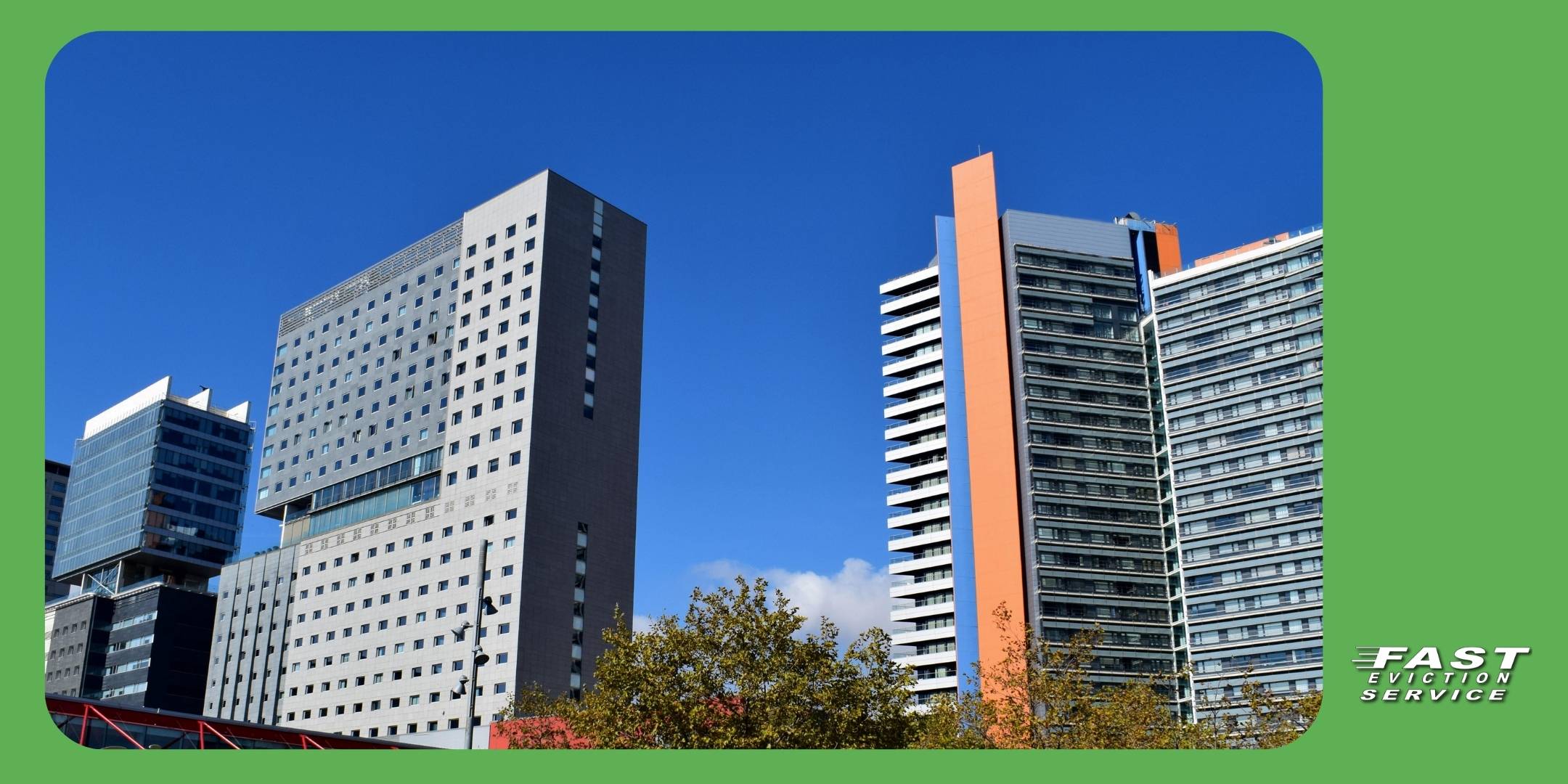Updated 05/13/25
As a landlord in California, you’ve likely seen how tenant protections have expanded over the years for residential renters. Now, thanks to California Senate Bill 1103 (SB 1103), similar protections are being extended to small commercial tenants. Starting January 1, 2025, this new law introduces critical rules that every commercial property owner should understand.

These updates include rent increase notice requirements, translated lease obligations, limitations on building operating cost charges, and stronger protections for specific types of small business tenants. Understanding commercial tenant rights in California under SB 1103 will be essential to maintaining compliance and avoiding legal trouble.
Too Long Didn’t Read: (TL;DR) SB 1103 expands key residential-style protections to certain small commercial tenants in California. These include rent increase notices, lease translation requirements, and strict documentation rules for operating costs. Landlords must update lease procedures and understand new limits on evictions and charges.
Table of Contents
- What Is California Senate Bill 1103?
- Who Qualifies as a “Qualified Commercial Tenant”?
- Building Operating Cost Rules for Commercial Landlords
- Notice Requirements for Commercial Rent Increases
- Lease Termination Rules for Small Commercial Tenants
- Language Translation Requirements for Lease Agreements
- Legal Penalties for Violating SB 1103
- How Landlords Can Prepare for California’s 2025 Law Changes
- FAQs About Small Business Tenant Protections in California
What Is California Senate Bill 1103?
California Senate Bill 1103 was signed into law on September 30, 2024, by Governor Gavin Newsom. The bill is part of a broader effort to support small businesses in the state by extending some of the protections already afforded to residential tenants.
SB 1103 applies to qualified commercial tenants and introduces new obligations for landlords. These rules govern how much notice is required for rent increases, when a lease must be translated into another language, and what documentation landlords must provide for shared building costs. In short, commercial tenant rights in California are getting stronger, and landlords must take note.
This legislation reflects the state’s recognition that many small businesses are still recovering from pandemic-related challenges and need added stability. By tightening regulations, lawmakers aim to ensure transparency, fairness, and predictability in commercial leasing agreements.
Who Qualifies as a “Qualified Commercial Tenant”?
The protections under SB 1103 don’t apply to all commercial tenants. Instead, they focus on businesses that fall under a specific set of criteria. These are known as “qualified commercial tenants.”
To qualify, a commercial tenant must be a microenterprise with five or fewer employees and limited access to financial capital, a restaurant with fewer than 10 employees, or a nonprofit organization with fewer than 20 employees. Tenants must also notify landlords of their status in writing, along with a self-attestation about their employee count. This declaration must be renewed every 12 months.
The purpose of these criteria is to ensure that the most vulnerable commercial renters receive support. Landlords must verify this status before lease signing and track it throughout the lease term.
Building Operating Cost Rules for Commercial Landlords
One of the most impactful parts of SB 1103 is the restriction on how building operating costs can be charged to tenants. Commercial landlords must now meet strict documentation and disclosure requirements before passing on operating expenses.
Costs must be distributed proportionately based on square footage or another justifiable method. Landlords must notify prospective tenants that they may request documentation supporting these charges. Upon request, documentation must be provided within 30 days. These costs can only include recent expenses from the past 18 months or anticipated expenses in the next 12 months.
Additionally, landlords cannot include expenses already paid by the tenant or reimbursed by third parties. Changing the cost allocation method to increase a tenant’s share also requires written notice and documented justification.
These updates mean landlords must keep precise records and prepare to share them upon request. If not, they risk claims of noncompliance and legal disputes.
Notice Requirements for Commercial Rent Increases
Commercial tenant rights in California now include stricter timelines for rent increase notifications under SB 1103. For month-to-month or shorter leases, landlords must provide at least 30 days’ notice for increases of 10% or less.
If the rent increase exceeds 10% (including all increases in the past 12 months), the landlord must give 90 days’ written notice. These rules are designed to give small businesses more time to plan and absorb cost increases, especially in uncertain economic conditions.
This requirement aligns with similar residential rent laws in California. It ensures that commercial landlords give fair warning before imposing financial burdens on small tenants.
Lease Termination Rules for Small Commercial Tenants
Terminating a small commercial tenant’s lease without fault now involves additional steps. If a qualified tenant has occupied the space for less than one year, the landlord must provide a 30-day notice.
For tenants with more than one year of occupancy, that notice period extends to at least 60 days. This rule applies even when terminating month-to-month leases and ensures that small tenants have enough time to find a new space or negotiate terms.
Landlords should review all termination procedures in their lease agreements and ensure proper compliance with these notice periods to avoid legal pitfalls.
Language Translation Requirements for Lease Agreements
If a lease was primarily negotiated in Spanish, Chinese, Tagalog, Vietnamese, or Korean, landlords must now provide a translated version of the agreement. This requirement applies only to leases with qualified commercial tenants.
Failure to provide a translated copy before execution gives the tenant the right to rescind the lease. This provision protects small business owners who may not be fully fluent in English and ensures fair communication during lease negotiations.
Landlords operating in diverse communities should proactively prepare translated versions of their standard lease forms to stay compliant and avoid potential cancellations.
Legal Penalties for Violating SB 1103
Violations of SB 1103 can lead to serious consequences. If a landlord improperly charges building costs, fails to provide notice of rent increases, or ignores translation requirements, they could face legal action.
Tenants can use noncompliance as a defense in eviction cases. Moreover, landlords may be liable for actual damages, attorneys’ fees, and potentially treble damages if willful misconduct is proven. The law also allows for punitive damages in cases involving oppression, fraud, or malice.
Landlords cannot waive these tenant protections, even through mutual agreement. This makes it critical for commercial landlords to fully understand and comply with each element of the law.
How Landlords Can Prepare for California’s 2025 Law Changes
The best approach for landlords is to prepare early. Property owners and managers should educate their teams about SB 1103 and review all lease templates. Consulting a real estate attorney to update lease terms and notices is highly recommended.
Organizing supporting documentation for operating costs, implementing rent increase timelines, and securing translated leases are all essential tasks before the January 2025 rollout. This proactive preparation ensures that landlords stay compliant and avoid legal and financial setbacks.
FAQs About Small Business Tenant Protections in California
What is SB 1103 and who does it affect?
SB 1103 is a California law extending tenant protections to certain small commercial tenants. It affects landlords who lease to microenterprises, small restaurants, or nonprofits.
Do all commercial tenants qualify for these protections?
No. Only tenants who meet the “qualified commercial tenant” criteria and provide proper documentation are eligible.
Can landlords charge tenants for building costs?
Yes, but only if they provide documentation and meet specific requirements under SB 1103.
What happens if a landlord violates SB 1103?
Tenants can sue for damages, recover attorneys’ fees, and even rescind leases in certain cases. Landlords may also face punitive damages.
Is a translated lease really required?
Yes, if the lease was negotiated primarily in one of five specified languages. Failure to comply gives the tenant the right to cancel the lease.


